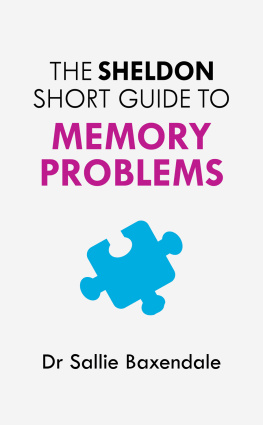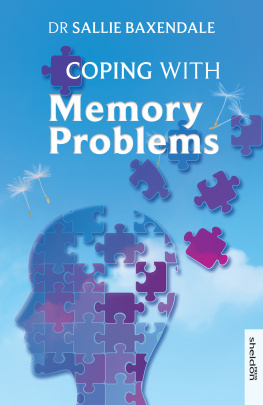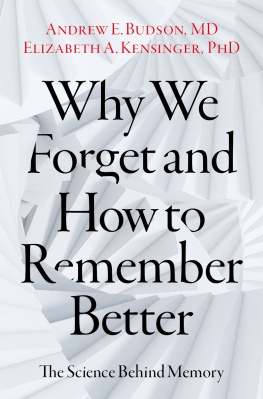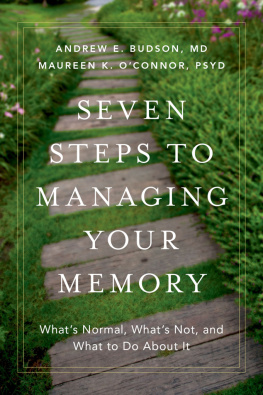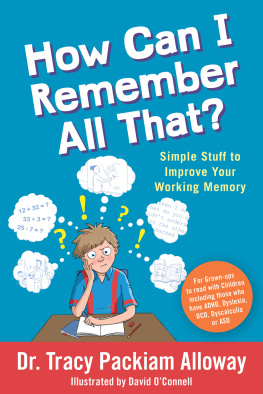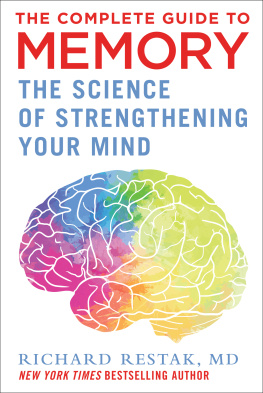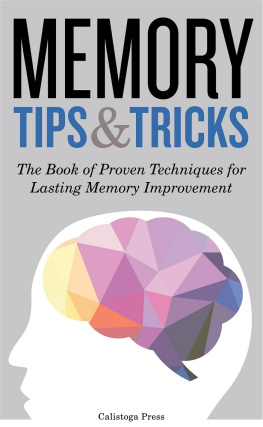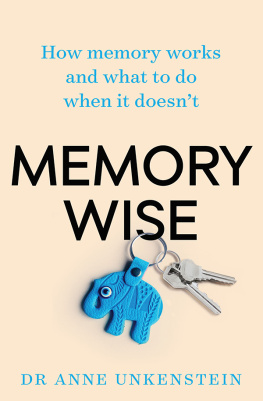
The Sheldon Short Guide to
Memory Problems
Dr Sallie Baxendale is a consultant clinical neuropsychologist who has worked with people with memory difficulties in the National Health Service for over twenty years. She is the author of more than fifty academic publications on memory function. Her work in this field ranges from the development of rehabilitation strategies to studies of the ways memory problems are misrepresented in the media. She currently works for the Institute of Neurology, University College, London. The full version of this book, Coping with Memory Problems (Sheldon Press, 2012), is recommended on the Reading Well Books on Prescription for dementia scheme.
Sheldon Short Guides
Depression
Dr Tim Cantopher
Memory Problems
Dr Sallie Baxendale
Phobias and Panic
Professor Kevin Gournay
Worry and Anxiety
Dr Frank Tallis
THE SHELDON
SHORT GUIDE TO
MEMORY
PROBLEMS
Dr Sallie Baxendale

First published in Great Britain in 2015 by Sheldon Press
An Hachette UK Company
Sheldon Press
Carmelite House
50 Victoria Embankment
London EC4Y 0DZ
www.sheldonpress.co.uk
Copyright Dr Sallie Baxendale 2015
All rights reserved. No part of this book may be reproduced or transmitted in any form or by any means, electronic or mechanical, including photocopying, recording, or by any information storage and retrieval system, without permission in writing from the publisher.
The author and publisher have made every effort to ensure that the external website and email addresses included in this book are correct and up to date at the time of going to press. The author and publisher are not responsible for the content, quality or continuing accessibility of the sites.
British Library Cataloguing-in-Publication Data
A catalogue record for this book is available from the British Library
ISBN 9781847093677
If you are struggling with memory problems yourself or are caring for someone who has memory difficulties, this book has been written to help you cope.
The book is divided into two parts. The first part explains how memory works and describes various aspects of memory function. The brain uses many different mechanisms to store and retrieve information and even in people with far-reaching memory difficulties, not all systems are affected to the same extent. The second part looks at some of the most common underlying causes of memory problems.
There are no silver bullets when it comes to improving memory function. This, as you will see, is a recurrent theme throughout the book. The strategies that can be used to cope with memory problems can be broadly divided into three groups.
Those that deal with the underlying problem . These strategies tackle underlying problems that are interfering with memory processing. There is a surprising amount that you can do, even if your underlying brain systems are damaged. (See .)
Internal strategies that you can use to exploit the way your brain works . The second set of strategies focuses on ways you can get the most out of your memory to try to maximize the likelihood that new information goes in and is properly processed in the first place, and minimize the obstacles that might prevent you from recalling it fluently later.
Outsourcing your memory functions to external agencies to reduce the load . The final group of strategies involves taking the load off an overburdened memory system by using external aids (from the good old-fashioned calendar to the most complex interactive digital apps) to record your information and jog your memory for you.
This three-pronged approach is unlikely to solve all your memory problems, but it may go a long way to reducing the nuisance they cause in everyday life, and that reduction lies at the heart of coping with memory difficulties.
The hippocampi
Throughout the book, reference is made to the hippocampi (plural). The word is taken from the French word for seahorses. The hippocampi are two seahorse-shaped structures in the brain that play a crucial role in creating new memories. There is one on the right-hand side of the brain and one on the left-hand side. It is still possible to form new memories if one hippocampus is damaged, but if both are damaged, severe memory problems occur. Generally speaking, large, plump hippocampi are an indication of a healthy memory system. However, there are many factors that have a detrimental impact on hippocampal health and that cause the structures to shrink. The second part of the book examines some of these factors and ways you can ensure your hippocampi stay as healthy as possible, including a healthy diet and regular moderate exercise.
In 2008, a family home in Manchester was burgled early on a Saturday evening. Not that unusual perhaps, except that the burglar stole items from the room in which the whole family sat watching a talent show on the television. Every member of the family was so engrossed in the programme that they failed to notice someone coming into the room, taking their belongings and leaving with them.
Its tempting to think of our eyes, ears and brain as a kind of video camera, capturing everything were exposed to in an objective, all-inclusive fashion. But in fact, everything we see has already been filtered and edited by our brains, long before we consciously process the new information. All too often we see what we expect to see and just dont notice the other stuff going on around us. We have evolved this way for a purpose.
Without this in-built filter, it is extremely hard to concentrate on anything. Without our even being aware of it, our brains filter out the irrelevant stimuli in our environment and help us to focus on whatever we have prioritized for the moment.
This is the first stage in the memory process. To remember something, we have to have paid proper attention to it in the first place.
This may seem obvious, but a failure to attend to something in the first place underlies many of the most common memory problems that people experience. For example:
My colleague introduced his wife at the party and 30 seconds later I just couldnt remember her name at all. It was so awkward.
Often we havent given ourselves a chance in these situations. The information just hasnt been processed properly in the first place.
Memory tip: Remembering names
If you know you are about to be introduced to someone, consciously anticipate that you are about to be given that persons name. Be waiting for it. Then interrupt the introducer as soon as you hear the new name and use it. For example, shake the persons hand and say, Hello Jane. This way, you have processed the name by saying it out loud while looking at the person.
I get back to the car park and just cant remember where I parked the car. Sometimes I just have to walk through the rows systematically until I spot it. Its so embarrassing.
Once a complex activity like parking becomes automatic, it frees up our brains to do other things at the same time. Thus it is possible to park on automatic and then lose your car in a car park. This tends to happen most frequently in car parks that people are familiar with. Its rare that people cant remember which car park they have left their car in, but the exact location of the car just wasnt processed properly.
Memory tip: Did I turn off the iron?
The same applies to the common problem of failing to remember whether you have done an everyday task, such as locking the front door or turning off an appliance. Often the reason we cant remember doing these things is that they are so automatic, we werent really paying attention at the time. Again, there is a relatively simple solution. If, when you turn off the iron, you say out loud , It is Tuesday morning and I have turned off the iron, you should have little difficulty remembering the action a few hours later. It is important to say it out loud as this ensures that you pay sufficient attention for the action to be consciously registered. And you need to make it time specific (e.g. Tuesday morning, Saturday afternoon) as this will give the memory a context. This will help you to remember it later.
Next page
